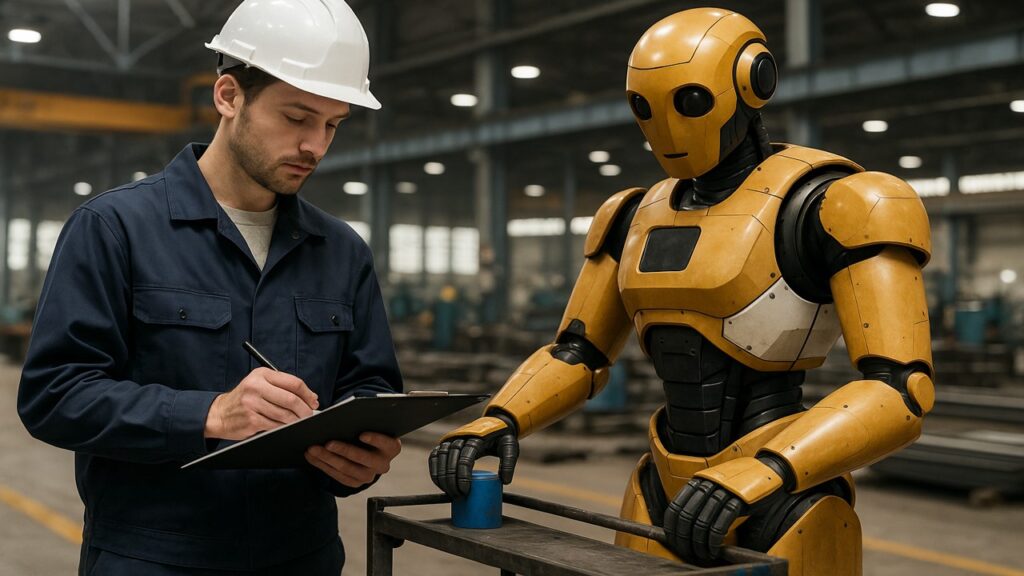Automation is not just technology – it’s a path to liberation
By Peter van der Wel
We are on the verge of a leap in our economic evolution – not a “quantum leap,” but a fundamental shift in era. The rise of generative AI shows us that not only hands, but also heads can be automated. Think of systems that draft legal advice, analyze medical reports, or write policy briefs. For organizations, this means efficiency and cost savings. But what do we lose when work is reduced to economic output alone? We risk a society in which empathy, craftsmanship, and human connection are structurally undervalued – simply because they don’t fit into spreadsheets.
Everyone is talking about AI right now – and rightly so. But in the short term, something just as radical is emerging: the rise of the labor robot. These humanoid robots represent a whole new phase of automation. They’re no longer science fiction. They walk, observe, collaborate, and navigate effortlessly through human environments. No longer bolted-down helpers on the factory floor, but co-workers you could shake hands with. They adapt to their surroundings, communicate with people, and take on tasks without each step needing to be pre-programmed.
From the duty to produce to the freedom to be human
Work has long been the gateway to security, status, and social participation. But that gate has become narrow. Too many people are stuck in work that makes them unhappy – monotonous, draining, or even harmful. Sometimes, it feels as though our systems are designed to keep people dependent rather than to empower them.
The labor robot gives us the opportunity to break free from that.
Of course, work is more than just an economic factor. It contributes to personal growth, social cohesion, and democratic participation. But precisely for that reason, it’s painful that so many people do work that exhausts rather than enriches them.
If robots can take over the work we no longer need to do ourselves, then we can finally turn to what really matters: a society where your value isn’t tied to your job, but to your contribution as a human being. Think of the roles we play as parents, neighbors, caregivers, makers, or friends. Work no longer needs to be the center of our lives. That shift demands a mental reset. We must dare to let go of the idea that value only comes through labor.
Robots in action: from factory to everyday life
These new labor robots are already becoming part of daily reality. In warehouses, they restock shelves. In healthcare, they assist doctors. In kitchens, they chop vegetables. On construction sites, they carry materials. And this is just the beginning. Everywhere that robots can work more cheaply per hour than humans, the decision for employers is obvious.
What makes these robots unique is their ability to operate in human environments and interact with people. That makes them a crowbar for social change. Because if they take over the work we no longer have to do, we can use our time for what truly matters.
The transition to a humane economy
We need a different kind of economy – one where technology serves humanity. An economy where security isn’t tied to productivity, but to the simple fact of being human. Where care, time, meaning, and sustainability are central. I call this the humane economy: an economy built around flourishing, not around the obligation to work.
But that requires redesigning our institutions – from taxation to social security, from education to the role of employers. It means building a society where time off isn’t something you earn after decades of service, but something you have access to throughout life. A society where care and creativity are taken seriously as full expressions of value.
An invitation to imagine
I’m not writing this as a technophile, but as a futurist and economist. In my books, such as Economics for World Changers and The Good Future, I explore how we can build a society where wellbeing comes before profit. In that journey, automation is not a threat, but a companion – as long as we embed it socially and politically, not just economically.
So let’s not wait for AI and robots to redefine work for us. Let’s take the lead and rethink it ourselves. Not to become less human, but to finally take our humanity seriously.
![]() Peter van der Wel (12025)
Peter van der Wel (12025)
—PS: Do you agree with the message of this blog? Feel free to share it on social media, or forward it to a colleague or friend who might find it interesting.
Did someone forward it to you? subscribe here to receive new blogs directly (for free).
PPS: I welcome your thoughts. You can email your response directly to me.
Peter van der Wel is a futurist, economist and author of books such as The Good Future and Economics for World Changers. His latest work, Robot Labor, explores how humanoid robots could fundamentally reshape our society.
